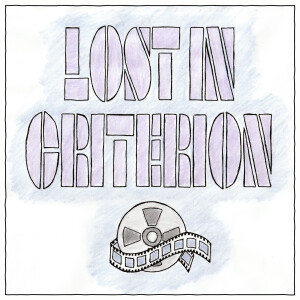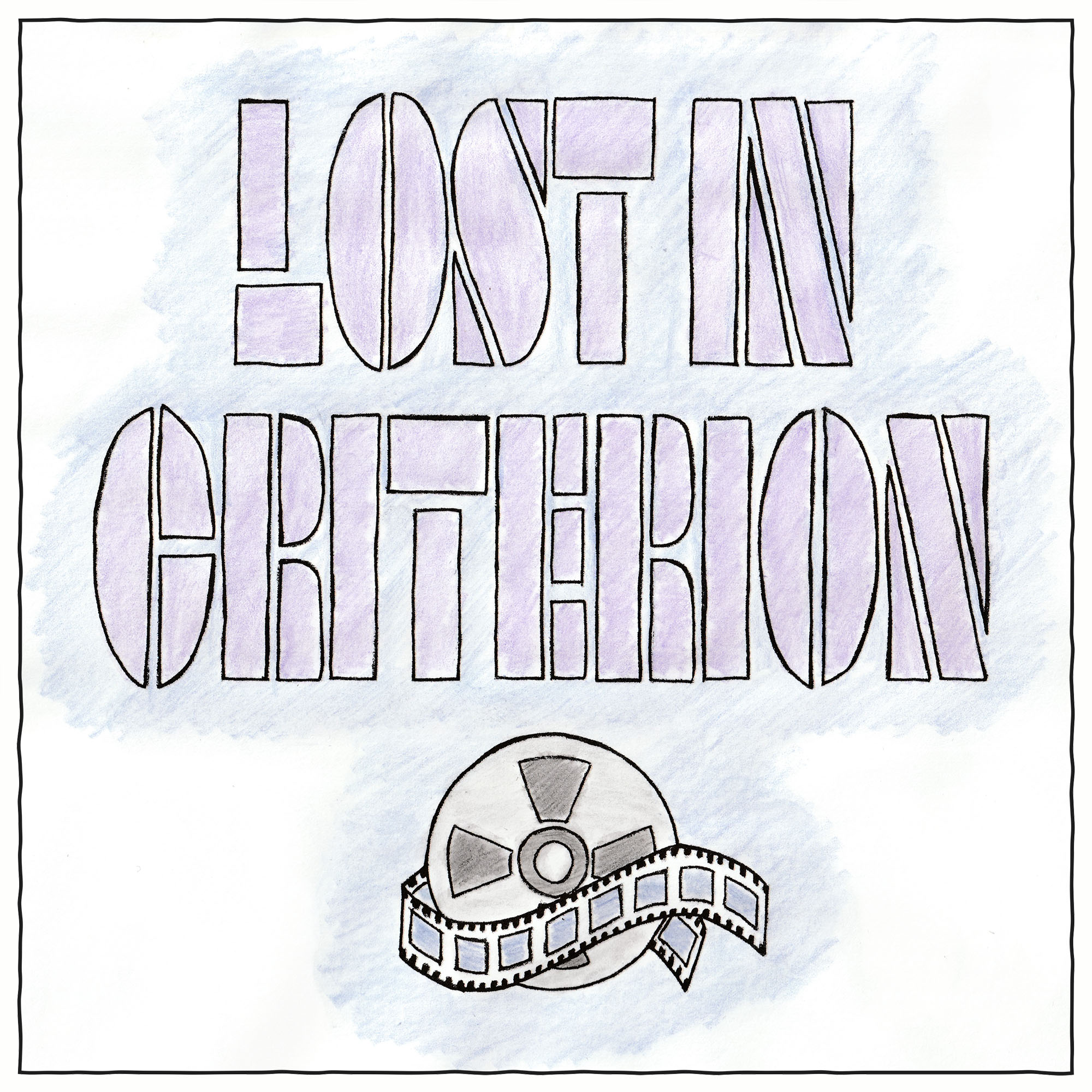Episodes

Friday May 04, 2018
Spine 292: Unfaithfully Yours
Friday May 04, 2018
Friday May 04, 2018
Preston Sturges's most intellectual film, Sullivan's Travels, was an argument that non-intellectual films are ok. People love them! Not everything needs a deeper point! Still, as we mentioned last week with Lubitsch's Heaven Can Wait, Criterion has a tendency to serve us intellectual films, and that makes talking about a movie that doesn't want to say anything an ever unique experience for us.
Of course 1948's Unfaithfully Yours is still a very smart film. It's pitch-perfectly crafted and intensely funny even while maintaining a certain level of suspense.

Friday Apr 27, 2018
Spine 291: Heaven Can Wait
Friday Apr 27, 2018
Friday Apr 27, 2018
It's been over two years since we've heard from Ernst Lubistch, despite his being one of the most influential directors in Hollywood. Back then we had the pre-Code Trouble in Paradise and its ridiculously risque writing, but 1942's Heaven Can Wait isn't quite so overtly sexual, in fact despite the plot stemming from the main character's insistence to Satan himself that he is an evil philanderer, we never really see him even approaching cheating on his wife.
It's almost relaxing to have a mid-century Hollywood comedy after a long, long run of films that want to say something, but maybe we're wrong about Lubitsch and Heaven Can Wait. What if this really is a political film? What if we can read a political message into anything?

Friday Apr 20, 2018
Spine 290: The Phantom of Liberty
Friday Apr 20, 2018
Friday Apr 20, 2018
With The Phantom of Liberty (1974) we have now watched Bunuel's final three films, and there's a very good chance that is the not so distant future I'll find it hard to say which memorable scene belongs to which movie. Phantom is no Discreet Charm -- nothing could be -- but it still has some brilliance in it, though it's buried a bit more under some not so great ideas. We've seen other directs throw vignettes at the wall and hope they stick, and thankfully Phantom is more Slacker than Schizopolis, though I'd probably rather watch either of those over doing this again.

Friday Apr 13, 2018
Spine 289: Hoop Dreams
Friday Apr 13, 2018
Friday Apr 13, 2018
We finish up an array of decidedly different documentaries this week with Steve James, Frederick Marx, and Peter Gilbert's Hoop Dreams, the story of Arthur Agee and William Gates, two young men from Chicago with athletic ambitions. Like Burden of Dreams -- though for vastly different reasons -- what was meant to be a short shoot ballooned to four years, and Hoop Dreams arrived as one of the best sports documentaries in history, as well as a lasting indictment on racism and classism in America.

Friday Apr 06, 2018
Spine 288: F for Fake
Friday Apr 06, 2018
Friday Apr 06, 2018
Before we started our journey of Lost in Criterion I owned two Criterion films: The Third Man and F for Fake. They also happen to be the two movies I most enjoy sharing with other people. I got to make my dear friend Pat watch The Third Man just over four years ago, and now I finally force him to watch F for Fake.
Directed, or perhaps curated, by Orson Welles with footage also directed by François Reichenbach, Oja Kodar, and Gary Graver, F for Fake is a sort of film essay about perceived expertise and fakery. It's a lesson we'll always need.

Friday Mar 30, 2018
Spine 287: Burden of Dreams
Friday Mar 30, 2018
Friday Mar 30, 2018
In a way Burden of Dreams reminds me of Black Narcissus, or at least Werner Herzog's calling the Amazon "obscene" as a balance against his star Klaus Kinski's insistence that it is "erotic" reminds me of the Archers' argument that India is too weird for westerners to manage living in. Director Les Blank, to his credit, is more sympathetic to the native peoples, even as his film focuses on Herzog's seemingly doomed production of Fitzcarraldo.

Friday Mar 23, 2018
Spine 286: Divorce Italian Style
Friday Mar 23, 2018
Friday Mar 23, 2018
Pietro Germi's 1961 comedy Divorce Italian Style is a satire of mid-century Italian manhood. Or it's not. We talk a bit about whether or not "satire" is an accurate term this week, as well as Fellini, because when do we ever not talk about Fellini?

Friday Mar 16, 2018
Spine 285: Ashes and Diamonds
Friday Mar 16, 2018
Friday Mar 16, 2018
We finish up the final chapter of Andrzej Wajda's Three War Films with a film that takes place in the aftermath of armistice. Well, armistice for some. Ashes and Diamonds is a brilliant piece of cinema the contemplates where a country can go after national trauma tears its core. It's also a film that exists in a suddenly more culturally open Poland and it wears its western influences on its sleeve.

Friday Mar 09, 2018
Spine 284: Kanal
Friday Mar 09, 2018
Friday Mar 09, 2018
We continue our journey through the Three War Films of Andrzej Wajda and our deep dive into Polish World War 2/Post-War history with Kanal, his second full length and a marked technical improvement from last week's A Generation.

Friday Mar 02, 2018
Spine 283: A Generation
Friday Mar 02, 2018
Friday Mar 02, 2018
We start a trip through the early work -- the War Films -- of Polish director Andrzej Wajda this week. We start with his first film, and indeed the first film for many of the on and off screen talent involved: A Generation from 1955. This film, made before the Soviet "thaw" hit Poland, cautiously tells the story of the Warsaw Ghetto Uprising in a way that hopefully won't make too many Poles angry, though mostly not making the Soviets angry. Wadja, to his credit, hoped the film would make people more communist than the Soviets ever wanted to be. It did not.
An editor's note: we've settled on a system where our episode numbers match to the film's Criterion Spine Number, but with boxsets that contain films that do not have their own number that always becomes iffy. As such we're going through the films chronologically and adjusting accordingly.

Friday Feb 23, 2018
Spine 281: Jules and Jim
Friday Feb 23, 2018
Friday Feb 23, 2018
We return to Truffaut this week, who we haven't seen since we finished the Adventures of Antoine Doinel. In fact this is our first Truffaut film in which Doinel is not a character. Jules and Jim, instead, is a period piece about a trio of friend and lovers whose situation becomes untenable. How Truffaut, and author Henri-Pierre Roche, choose to resolve the untenability is the sticking point of the film for us, particularly because Roche's original novel is "semi-autobiographical" and the ending is one aspect that earns that"semi".

Saturday Feb 17, 2018
Spine 280: The Sword of Doom
Saturday Feb 17, 2018
Saturday Feb 17, 2018
Donovan Hill joins us as our resident Samurai film buff, and that's always fun. If you like hearing Donovan rant, and I know I do, he joins us for non-Samurai films over on the Patreon bonus episodes more often and it's always a treat.
We're talking Kihachi Okamoto's The Sword of Doom from 1966 and boy is it nihilistic. That's something Donovan knows a bit about as well. Good times! But for serious, this is good conversation. It's also long. Clocking in as one of the longest episodes Lost in Criterion has had because of the enlightening exploration of Japanese cultural history that Donovan and Pat provide.

Friday Feb 09, 2018
Spine 279: Young Törless
Friday Feb 09, 2018
Friday Feb 09, 2018
As evident in our journey through Criterion, Volker Schlondorff makes interestingly complicated films that press viewers to think about human behavior and how we treat one another. Also ones in which a good chunk of humans, particularly men in the ethnic majority, are sociopathic. These themes, of course, are not uncommon in German cinema of the post-WW2 era.
1966's Young Törless is another variation on that melody, this time emphasizing the ease with which we go along with the oppressive behavior of others in order to fit in. The narrative is not without its own problems, but Schlöndorff manages to remind us how easy it is to help the oppressor, and to slip away convinced you did nothing wrong. It's a lesson much of humanity, again particularly men in the ethnic majority, still needs to learn.

Friday Feb 02, 2018
Spine 278: L'Eclisse
Friday Feb 02, 2018
Friday Feb 02, 2018
A little over three years ago Lost in Criterion watched the first film in a trilogy of sorts by Michelangelo Antonioni. We were not impressed with L'Avventura, but could it be that by the the last film of the trilogy we'd could get into a Antonioni film? Marginally!
1962's L'Eclisse isn't quite as tedious as I remember L'Avventura being, though I think I'm understanding Antonioni's perspective a bit better now. If there's one thing long time listeners may have noticed, it's that the longer we spend in the Criterion Collection the less Lost we feel -- but that doesn't mean we can't still feel totally Lost at times. Anyway, there's still the fact that I watched L'Eclisse twice and when I sat down to edit this week's episode I couldn't remember a thing about it. Though to be fair to myself I've also watched Groundhog Day 12 times in the intervening 3 weeks, so my brain is a bit fried.

Friday Jan 26, 2018
Spine 277: My Own Private Idaho
Friday Jan 26, 2018
Friday Jan 26, 2018
Gus Van Sant originally started writing the film that would become My Own Private Idaho in the 70s, and wrote the other two films that would become My Own Private Idaho sometime before the film came out in 1991. Somehow despite the fact that it is very clear which portions of the final film come from the Shakespeare modernization script the film works cohesively -- just with wild changes in tone.

Friday Jan 19, 2018
Spine 276: The River
Friday Jan 19, 2018
Friday Jan 19, 2018
The River finds Renoir making his first color film which is also the first color Technicolor made in India. Made in 1951, just after India's independence, in the Bengal region, and based on the memoirs of Rumer Godden (who also wrote Black Narcissus). While the Archers ultimately seemed to be arguing that India is just too weird for Brits, The River has a little more respect for the population it's movie is ostensibly about. A very little more.

Friday Jan 12, 2018
Spine 275: Tout va Bien
Friday Jan 12, 2018
Friday Jan 12, 2018
Tout va Bien (roughly translated: "This is fine"), is the 1972 culmination of Jean-Luc Godard and Jean-Pierre Gorin's Dziga Vertov Group, a production group focusing on Marxist/Maoist revolution mostly through documentary, though Tout va Bien is a narrative film. It is, however, paired with the didactic documentary Letter to Jane, a postscript to Tout va Bien the dissects the famous Hanoi photo of Jane Fonda, star of the film who in the months following the release of Tout va Bien became an international talking-point. Ultimately, the film stands to ask the question "What is the role of the woke upperclass in the revolution?" and how that intrinsic to finding the right answers is asking the right questions.

Saturday Jan 06, 2018
Spine 274: Night and the City
Saturday Jan 06, 2018
Saturday Jan 06, 2018
Jules Dassin moved to Europe in 1950 to avoid the blacklist, and his first stop was London -- The City -- where he made Night and the City seemingly quite hastily -- he claims he never even read the script. Fortunately, Dassin could hit all the notes of noir in his sleep. Unfortunately, it seems like he did.

Friday Dec 29, 2017
Spine 273: Thieves' Highway
Friday Dec 29, 2017
Friday Dec 29, 2017
After making Thieves Highway in 1949 Jules Dassin was blacklisted for being a communist. The movie is about working class men -- Army vets at that -- trying to use capitalism to pull one over on a small-time robber baron, and when that fails there's some violence. It's not quite Marx, but it's not quite not Marx.
Anyway, Dassin would flee to Europe and continue working, first with Night and the City which we'll talk about next week, and later with Rififi, his masterpiece.

Sunday Dec 24, 2017
Holiday Special 6: In Bruges
Sunday Dec 24, 2017
Sunday Dec 24, 2017
We gather old friends Stephen, Jonathan, and Sam, and newcomer Ben Jones-White around for our traditional end of year non-Criterion film. This year it's In Bruges!

Friday Dec 22, 2017
Spine 272: La Commare Secca
Friday Dec 22, 2017
Friday Dec 22, 2017
An Italian neorealist film where the prostitute doesn't represent the state of the nation! Probably. I mean, you could probably interpret it that way if you wanted.
Bernardo Bertolucci's debut, La Commare Secca is, in a lot of ways, clearly directed by a 20 year old first timer. But it's also got some really good stuff going on, even if it's a Rashomon-plot done by a guy who absolutely swears he's never seen Rashomon. We don't believe him, but it doesn't matter either way. La Commare Secca tells its story of on the ground life below the zooming highways, out of sight down by the river, and it's tells it well.

Friday Dec 15, 2017
Spine 271: Touchez pas au grisbi
Friday Dec 15, 2017
Friday Dec 15, 2017
We get one last film from Becker and it's a French gangster film starring the star of French gangsterdom: Jean Gabin.
With Touchez pas au grisbi (1954) Becker does his Becker thing of focusing on the minor character elements instead of the plot points and manages to make one of the few French gangster films outside of Rififi that doesn't bore me.

Saturday Dec 09, 2017
Spine 270: Casque d'Or
Saturday Dec 09, 2017
Saturday Dec 09, 2017
We really, really loved our last outing from Jacques Becker. Le Trou stands as one of the pinnacles of non-horror suspense films we've seen. It was also Becker's final film, so perhaps we should assume that his earlier work would be less impressive.
We return to Becker this week with a period piece based on a real historical love triangle involving a woman with blond hair and some members of the notorious Parisian street gang Les Apaches.
Maybe it just suffers for not seeming as innovative as Becker's other work. Maybe the fact that it is a basic criminal love story is why it's so interesting as a Becker work. Though there's also that final sequence to redeem it. Maybe.

Friday Dec 01, 2017
Spine 269: Fighting Elegy
Friday Dec 01, 2017
Friday Dec 01, 2017
The year is 1966 and Seijun Suzuki's relationship with his longtime studio Nikkatsu is strained to say the least. Tokyo Drifter left him on double secret probation and barred from using the companies color film stock. Branded to Kill would ultimately get him fired. But between those two brilliant pieces of art comes Fighting Elegy, an anti-"red pill" film attacking toxic masculinity and militarism. Written by Kaneto Shindo who directed Onibaba and, turns out, was a left-wing activist, Fighting Elegy is a farewell to arms and the ideas of manhood, sex, and power that fed authoritarian nationalism that led to nearly 3,000,000 Japanese dead in World War 2. It's also funny -- like Vonnegutianly so -- and shot with all the beautifully off-the-wall style we expect from Suzuki, but in this case those wacky visual choices actually land in a philosophical style, too.

Friday Nov 24, 2017
Spine 268: Youth of the Beast
Friday Nov 24, 2017
Friday Nov 24, 2017
It's been 4 years since we last saw a Seijun Suzuki film.
It's been too long.
Branded to Kill and Tokyo Drifter were early favorites for Seijun's ridiculous sense of style and clear disdain for being told what to do. Made a few years and a few dozen films earlier in 1963 is Youth of the Beast, a Yojimbo-tale of an ex-Cop investigating his former friends death. Of course that plot synopsis glosses over the Seijun flare that makes it a film worth watching. And it is very much worth watching.

